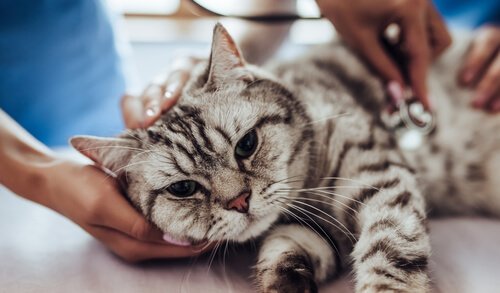Giardia in Cats: symptoms and transmission

There are so many different kinds of illnesses your cat can get during their life. Especially, there’s one common intestinal problem that’s worth knowing about. To find out more, read this article to learn about the symptoms and transmission of giardia in cats.
What is giardia?
First, you need to know a bit about this disease. It starts out as a kind of parasite called giardia. The parasite causes “giardiasis,” which is the scientific name for this condition. As time goes on, it deforms the small intestine and stops it from functioning properly, which causes their body not to absorb fat or vitamins properly.
If you don’t treat this condition quickly enough, giardia can even make its way into the large intestine. If that happens, your cat’s entire digestive system will be even weaker. As always, the earlier you spot it, the better.
This parasite makes its way into the small intestines of house cats, and if it’s not treated in time, they can spread to the large intestine and weaken their immune system.
Giardia transmission
If your cat has feline immunodeficiency virus or leukemia, it will have a greater risk of contracting giardiasis due to their low defenses.
It’s common in young cats that haven’t gotten all of their vaccinations. Likewise, it’s common in elderly cats due to the toll aging takes on the body.

It’s also important to remember that giardia is more common in cats that live together, or for cats that have frequent contact with other cats. Here are the main forms of transmission of this parasite:
1. Feces
If your cat smells the feces of another cat (that’s infected), they could contract giardia. This can also take place if they step in another cat’s feces and then licks its paws.
2. Direct contact
Another major way cats transmit giardia is by being very close to another animal that’s infected with these parasites, whether they live together or not. Keep a close watch on your cat if they tend to lick others, and try to stop them from continuing doing it.
3. Contaminated Water
If your cat drinks out of a puddle or a container that has extremely old water, it could get all kinds of illnesses besides giardia.
4. Poor hygiene
Cats are generally very clean and hygienic animals, but sometimes the dirtiness of the outside world is too much for them to handle. Therefore, it’s a good idea to thoroughly bathe your cat every so often.
What are the symptoms of giardia in cats?
Cats are not able to use words, but animals can still use movements, sounds, and attitudes to express themselves. When your cat is sick, it will have less energy, avoid eating, and spend a lot of time sleeping.

Here are some of the symptoms of giardia in cats. If you notice your cat having more than one of them, then take them straight to the vet.
1. Gas
Your cat will be gassy more than they normally are and the smell will be much worse than usual.
2. Diarrhea
Your cat might also have a lot of sudden, very liquidy bowel movements. Take extra care if your cat has diarrhea because it causes dehydration. Make sure it drinks lots of water.
3. Loss of appetite
This is a clear sign that something is wrong with your cat. If they don’t want to eat, try giving them canned food because the taste is much more appetizing. If they still don’t want to eat, then don’t let too much time to pass by before taking them to the vet.
4. Vomiting
Due to this disease slowly wearing down your cat’s digestive system, it can start causing problems in the stomach and intestines.
5. Fatigue
Your cat will also feel apathetic. They won’t want to play or even get out of bed. Their exhaustion is quite obvious, even if they have only moved around a little bit.
In order to giardia in cats, they might have to take certain medications during a couple of weeks. If your cat receives the right dosage and is kept clean, then they will get better in no time.